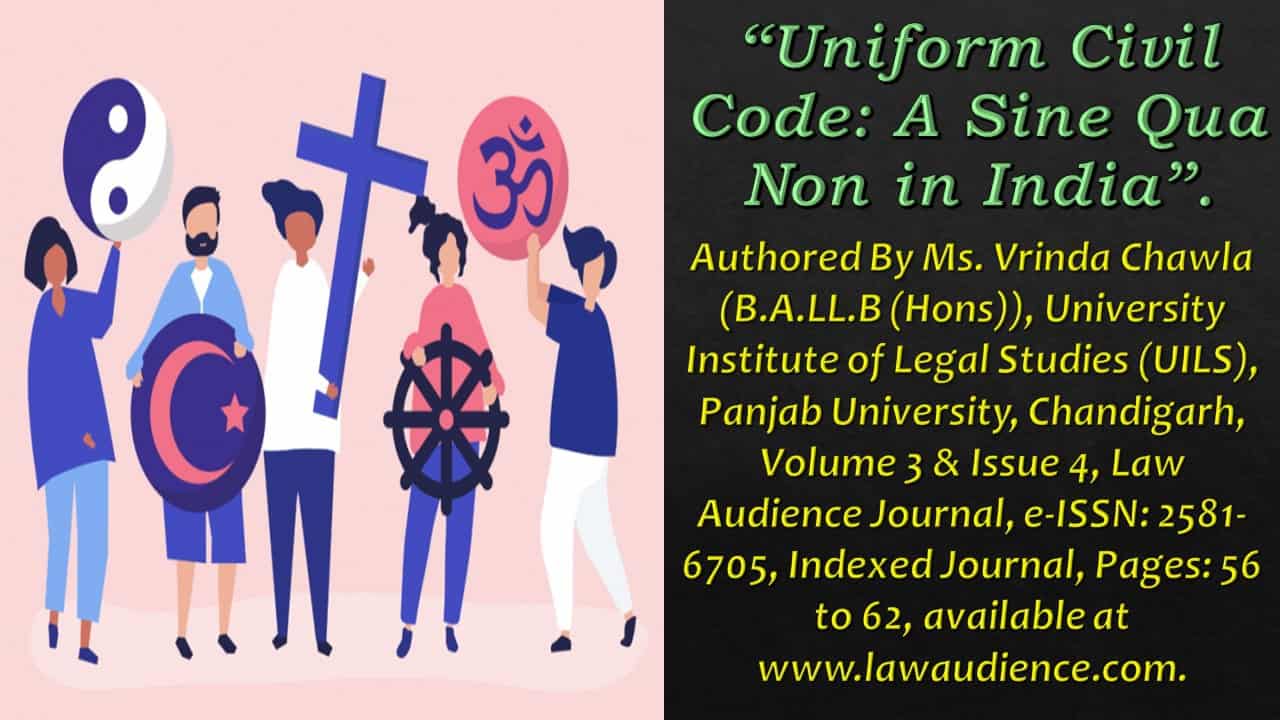Click here to download the full paper (PDF)
Authored By: Ms. Vrinda Chawla (B.A.LL.B (Hons)), University Institute of Legal Studies (UILS), Panjab University, Chandigarh,
Click here for Copyright Policy.
ABSTRACT:
“India, being a diverse and heterogeneous country has always suffered from internal conflicts and friction. The same has led to disadvantages at a huge level, the energy which was supposed to be focused on developmental activities has gone to wilt. This conflict is caused due to multiplicity, and is fuelled even more when people realise that one community is favoured over the other. Uniform civil code has been of utmost importance, but could not be implemented earlier due to volatile nature of communal identity. But today, when minority is safe and other things require more importance than inter-community friction, it is the right time to implement UCC. Many grievous issues which are capable of leaving a permanent mark on upcoming generations such as Interfaith marriages which as shamed to all extents, minority appeasement, cruelty of certain religions which cannot be changed due to the non-existence of uniformity need an immediate solution, so that we can step towards a better future.
Judiciary has finally taken some staunch steps by directing the govt to take swift steps towards implementation of UCC, previously, the supreme court has never suggested the same as it may spark off communal flaks. But today, even the minority realises the value of being a part of uniform community. Many hints have been passed from the govt as well which suggest that UCC might be brought into existence soon, which depicts the serious value of the same. Thus, the huge paramount of this code and the addition it is going to do in our society should not be forsaken, as it is a sine qua non for a developing nation like India”.
I. BACKGROUND:
When India gained independence, there lied a tremendous task in front of the leaders of free India, the task of making a steady and well-constructed Constitution. A constitution that will fulfil longstanding thirst and seeking of Indian citizens. After a plenty investment of time, almost 3 years, the holy book of Indian Constitution came into existence. It was an idol of perfection created after much labour and hustle. Almost all the aspects of human life were covered by this set of rules, be it the civil wrongs, economic laws, criminal code and what not. In the same course of action, the most sensitive aspect of RELIGION was covered as well.
Indian constitution vocalised that the Nation of India would maintain a principled distance from affairs of religion and personal laws of different communities due to the vulnerable nature of the same. All the citizens, regardless of everything, were given lasting rights to follow their religion and customary laws, regarding marriage, family, adoption, inheritance and every other strand which can be seen under the umbrella of family law. Principled distance basically means that the state would not interfere in the matters of religion unless necessary, and inversely, religious organisations would not try to dominate governance of the nation. The same theory is being followed by Indian govt since independence, thereby maintaining a peaceful undertone among various factions.
II. WHAT IS A UNIFORM CIVIL CODE?
As suggested by the name of Uniform civil code, it is a code that seeks to establish Uniformity by implementing same law in the matter of family, marriages, divorce and every other matter covered under personal law. Currently, there are separate codes of each religious community which govern these affairs such as Hindu law, Muslim law and Parsi laws etc. All of the people are given complete freedom to follow the rules laid by their own religion, for example, Muslims are allowed to have as many as 4 marriages, because the same is legalised by their religion and is treated as monogamy up to the number of 4 wives, on the other hand, factions covered under Hindu law including Hindus, Sikhs, Jains etc can only perform an actual MONOGAMY i.e., a single marriage. If the Uniform Civil Code is implemented, all of these groups and communities will be governed by the same personal laws, which means, identical laws will decide the course of actions of all people regardless of their religion or place of residence.
Just by glancing at this provision, one can easily determine its sizeable significance, especially in a diverse country like ours, where conflict lies at the drop of a hat. But an interesting feature of our constitution is that it does not make UCC a staunch pillar. Unlike fundamental rights, which are enforceable by the courts and are guaranteed to each and every citizen by process of law, Uniform civil code was added into constitution as a Directive Principle of State Policy under article 44, that is, a principle which is not legally enforceable but is supposed to direct the state towards the correct path and right destination. The future leaders and govts were made free to implement UCC when the right time came, because as it was rightly understood, the early years after independence were quite sensitive as due to the recent communal happenings including the partition, such a strong step like uniform code would have been a hard blow to the already complex and delicate sitch.
The most recognised advocate of Uniform civil code was Dr.BR Ambedkar, who believed that India can grow as a nation only when people of the country recognize themselves as part of the same discipline. Due to the multiplicity of communities in the country, different laws have been applied, this is the root cause of grave communalism as people aren’t able to identify with each other. At one point the minority feels endangered, but on the flip side, majority realises the disadvantaged position they are facing simply because they’re larger in number. All of this led to the increased friction and eventually, a divided nation. But Ambedkar’s proposal was not widely accepted at that time, and most of the people in constituent assembly were critics of the same as they considered this code as an obstruction to Article 25 which gives every person the right to freely profess his religion.
Thus, uniform civil code has been recognized as a necessity since years and decades, but has been in a debated state since the beginning. An uncontradicted opinion is that the requirement of this code was never as grave as it is today.
III. WHY THE GRAVE URGENCY?
Today, we live in an extremely volatile society, supplemented by internal conflicts of the society. This muddle can be seen at its peak in developing countries like ours. Hindu-Muslim conflict has never been a secret in India, planted in the early days of British rule, brought to the highest summit due to their “Divide and Rule” policy, which further did the rift. The classic produce of this was the partition of Hindustan into India and Pakistan while attaining freedom due the extremities of this conflict. Post-independence era, which was somehow expected to bring a feeling of fraternity due to sense of belonging to one nation, actually did the opposite. The recent Hijab conflict in Karnataka[1], protests against CAA are evident of this face that instead of declining, friction is on a rising pace. The specifics mentioned above have been there since decades, but they are relevant in today’s time more than they’ve ever been. The time where many people have moved beyond the irrational continuing wrestle of religion, communities, sects and cults to greater things which actually matter like economies, development of science, we still have a majority of people among us who would rather get involved in a cat fight than to move beyond, simply because they’re too consumed by traditional, or rather orthodox notions. Implementing UCC can greatly help reduce the differences in society, when people will feel a sense of belonging to each other and the law of land.
One steaming topic revolving around the same is Interfaith marriages. Exogamy has never been a normalcy in the society where we live. Marriages out of the same caste are not accepted by the families, let alone a marriage to a person belonging to another religion. Marriage is a sacred union between two people who want to spend the rest of their lives with each other, in such a way that it leads to happiness. Where, as an evolving society, we should be the ones to support and promote it, in order to break the walls between people, contrary is being done at our ends as a whole. The recent enactment of Acts such as “Prohibition of unlawful religious conversion ordinance[2]” in the year 2020 depicts how a decay still persists in the roots. Ideologies such as “Love Jihad” which actually stand baseless are being given weightage. Even the couples which are marrying consensually, are supposed to inform and register their marriages 30 days prior so that govt can make checks on forcible conversions. What exactly is the purpose of such provisions, if not clearly reciprocating the divide and rule policy once again? Another interesting fact is that the most communal states in India, including Gujrat (Godhra riots), Uttar Pradesh (Babri masjid riots) are the pioneers of enacting such fuelling act, making the differences more sensitive. Implementing a Uniform code for all the factions in country can help to normalize interfaith marriages, making people more tolerant of each other, of different religions, and to accept the basic doctrine of humanity.
Another factor which can be considered as an important reason for urgent implementation of Uniform civil code is Minority appeasement, which serves as a curse to Majority and thus, urges both to clash. This has become a universal happening, especially for hugely diverse countries like ours, where majority is almost equal to combined minorities. Even the majority is further divided into castes, classes, and many other similar religions are covered under the same law. Specific favours to minority, where even the wrongdoings of them go unnoticed surely creates sparks. This was transparent in Shah Bano case, where supreme court made an attempt to grant protection to Muslim women, but the same was soon reversed by the govt of those times just for political gains by the enactment of Muslim Women’s Protection Act, 1986, further declining the conditions of Muslim women in India.
An attempt has been made by the current central govt to finally make actual betterments in the same, whereby The Muslim Women Act, 2019, has been formulated to provide protection to women against triple talaq, a brutal form of misogyny approved by Muslim law. At one point of time, the majority starts to realise the disadvantages they’re being forced to face just because they’re more in number, which is nothing but unfair. Implementation of uniform civil code can help to bring a uniformity in population, where internal conflicts will greatly be reduced because of generation of feelings of oneness and belonging to the same nation.
IV. STAND OF INDIAN JUDICIARY:
During initial years, the apex court did not give major focus to the implementation of DPSPs because the judiciary was still in a developing stage and other important arenas required more dedication. The UCC was especially kept on a back foot due to vulnerable communal disharmony. Weightage was given to directive principles for the first time in Minerva mills case, where even though fundamental rights hold a higher position due to being enforceable, court directed implementation of directive principles more seriously for better governance of the country.
Implementation of uniform civil code particularly was indicated and insisted upon for the very first time in Shah Bano case, where pitiable conditions of Muslim women were pointed out due to certain provisions including triple talaq, no maintenance post-divorce etc. But nothing could be done because Islamic law commands over this community. It was this when the apex court gave such signals to the govt so that betterment could be done and equality before law could be brought which was not possible with separate personal laws.
Recently, in response to 17 petitions filed regarding the same, Allahabad High court has directed the central govt to take strong steps over enactment of UCC[3] as the same has become a necessity now, a uniform code is the very foundation of a progressive society in order to reduced communal conflicts. The court also stated that now the situations have changed drastically, as compared to what they were 75 years ago, now the minorities are no longer living in fear, and thus, the right time for ratification of this code.
Many happenings in the recent times indicate the seriousness of govt towards implementation of UCC, which has even been included in the manifesto of a few political parties. This signifies that execution might be done soon for creation of a united India. Recent guidelines of the court have created a decent amount of pressure once again, which might speed up the process. Ministries have also released statements in the time relating to the same. UCC will be a binding force and foundation stone of this nation, and thus should be brought into existence as soon as possible.
V. CONCLUSION:
India is a nation with extreme heterogeneity since decades. Even though, the mix and variety of people has contributed largely to the development as everyone brings something new to the table, its largest contribution remains the internal conflicts and differences in people. The uniform civil code has become a necessity in order to create a strong base for upcoming future, to avoid the mistakes already committed in past.
Now, it’s high time to finally created a UNITED India, the only visible way to which is implementing uniformity and consistent regularity through UCC, a one stop solution can be done to tons of existing problems in the country. Even though, initial implementation is surely going to be hard due to tough resistance from almost all front, for political or religious gains, but without the cross how can we expect the crown?
Recent efforts of the Judiciary and Government combined give certain hope that this boon might be granted soon. Thus, it can be concluded that the value of a uniform code should not be taken for granted and efforts should be made to bring it into existence.
Cite this article as:
Ms. Vrinda Chawla, “Uniform Civil Code: A Sine Qua Non in India”, Vol.3 & Issue 4, Law Audience Journal (e-ISSN: 2581-6705), Pages 56 to 62 (5th March 2022), available at https://www.lawaudience.com/uniform-civil-code-a-sine-qua-non-in-india/.
Footnotes & References:
[1] Divya Arya, Karnataka Hijab Controversy Is Polarising Its Classrooms, available at https://www.bbc.com/news/world-asia-india-60384681#:~:text=The%20hijab%20has%20become%20the,from%20classes%20for%20wearing%20headscarves.
[2] The Uttar Pradesh Prohibition of Unlawful Conversion of Religion Ordinance, 2020, summary available at https://prsindia.org/bills/states/the-uttar-pradesh-prohibition-of-unlawful-conversion-of-religion-ordinance-2020#:~:text=Causing%20religious%20conversion%3A%20The%20Ordinance,and%20conspiring%20to%20such%20conversions.
[3] Omar Rashid, Allahabad High Court Urges Centre to Speed Up Uniform Civil Code, available at https://www.thehindu.com/news/national/allahabad-high-court-urges-centre-to-speed-up-uniform-civil-code/article37582213.ece.





